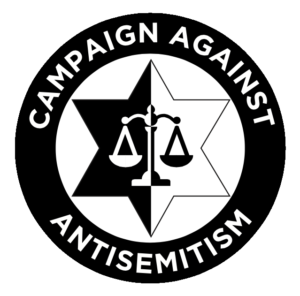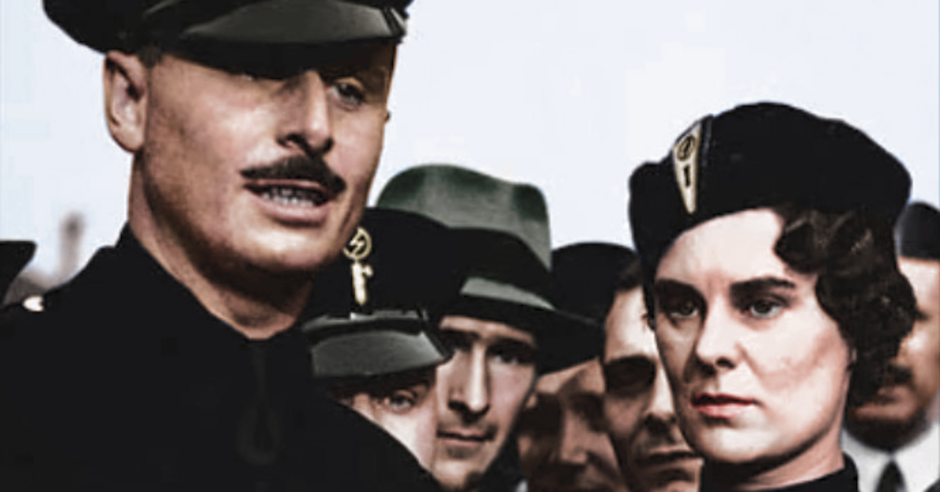Following contact from CAA, BBC Sounds agrees to add context to Lady Mosley interview containing Holocaust denial
BBC Sounds, an online streaming platform that contains live and archived radio broadcasts, has agreed to include additional background information about the content of an interview containing Holocaust denial, after contact from Campaign Against Antisemitism.
The interview in question is between interviewee, Lady Diana Mosley, and interviewer, Sue Lawley, and was first broadcast in November 1989 as part of the BBC’s Desert Island Discs series. Lady Mosley was the wife of Sir Oswald Mosley, the leader of the antisemitic British Union of Fascists. The two wedded in Joseph Goebbels’ house in the presence of Adolf Hitler.
During the interview, Lady Mosley, who died in 2003, reportedly says of her late husband: “He didn’t know a Jew from a gentile…as the Jews were so anti him and attacked him, he, as it were, picked up the challenge.”
When Ms Lawley asked Lady Mosley whether she believed that six million Jews had died in the Holocaust, Lady Mosley replies: “I don’t really, I’m afraid…believe that six million people were…I just think it’s not conceivable, it’s too many.”
“But whether it’s six million or one really makes no difference morally, it’s equally wrong,” Lady Mosley adds. “I think it was a dreadfully wicked thing.”
Lady Mosley also referred to historians’ reporting of Hitler as “nonsense”, adding that “if you don’t like someone, you attack them.”
Ms Lawley reportedly told Lady Mosley that “It’s almost as if you’re rewriting history.” She also said, in response to Lady Mosley’s denial of her husband’s antisemitism, “But did he not call them [the Jews] ‘an alien force which rises to rob us of our heritage’?”
At first, a BBC spokesperson said: “This episode of Desert Island Discs is part of the most complete possible archive resource of programmes from the past 80 years and is not something that is being newly transmitted. The programme page indicates that Lady Diana Mosley was married to Sir Oswald Mosley, the leader of the British Union of Fascists, and clearly shows the date of broadcast. Radio 4’s audience is likely to be aware of the controversial views that Lady Diana Mosley held if they choose to explore the archive.”
However, Campaign Against Antisemitism complained to the BBC that more specific background information about the interviewee should be provided. The omission of such information was particularly noteworthy given, as The Telegraph reported, the BBC was appending such warnings to its backlog of fictional programmes, such as Dad’s Army.
The BBC has now responded to us to say that, following our complaint, “for clarity, we have now provided updated and additional information about the content, including highlighting her denial of the Holocaust.”
A spokesperson for Campaign Against Antisemitism said: “We are pleased that, following contact from us, the BBC is bringing its provision of background information in relation to actual Holocaust deniers in its archive into line with the context that it provides for its backlog of fictional programming. We would like to think that this is the beginning of a new responsiveness to Jewish communal concerns at the BBC, given recent events and the broadcaster’s record.”
Recently, Campaign Against Antisemitism visited Broadcasting House, the BBC’s headquarters in London, to tell the Corporation to “switch off the Jew-hate”. We projected selected instances from just the past eighteen months of the BBC’s bias against Jews or antisemitism onto the broadcaster’s iconic building. The intervention came as the BBC is rocked with controversy over antisemitism, triggered by its abominable coverage of an antisemitic incident on Oxford Street which its Executive Complaints Unit has largely defended (and even that defence has had to be further clarified). In December, we held a rally outside Broadcasting House, attended by hundreds of protestors, to deliver the message: “BBC News: Stop Blaming Jews!” Lord Grade, a former Chairman of the BBC, told Podcast Against Antisemitism that the BBC’s reportage was “shoddy journalism” and called for answers in a video supporting the rally, which was endorsed also by Dame Maureen Lipman.
Ofcom is now investigating the coverage, which, as our projections onto the Broadcasting House showed, is only one example of many in which the BBC has exhibited bias against Jews or even indulged in antisemitism. The result has been the gradual erosion of the Jewish community’s confidence in the BBC.
Polling that we conducted in 2020 for our Antisemitism Barometer already revealed that two thirds of British Jews were deeply concerned by the BBC’s coverage of matters of Jewish concern, and 55% by its handling of antisemitism complaints. It is likely that these figures would be even higher if polled today.
Campaign Against Antisemitism monitors traditional media and regularly holds outlets to account. If members of the public are concerned about reportage in the media, they should contact us at [email protected].



